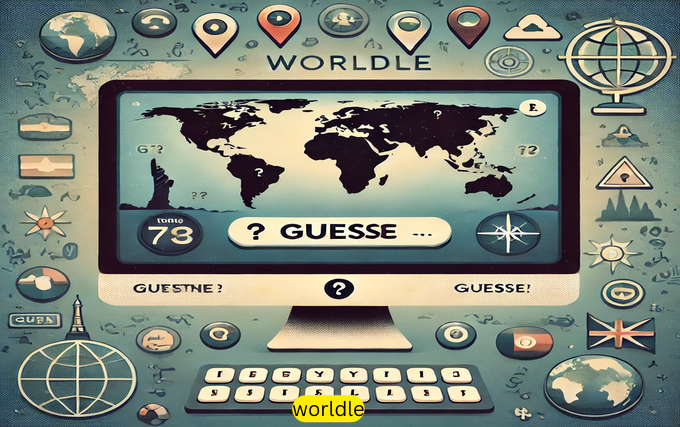In the ever-evolving landscape of online games, a new sensation has emerged, captivating geography enthusiasts and casual gamers alike. Worldle, a geography-based puzzle game, is rapidly gaining popularity for its educational value and addictive gameplay. This article dives deep into the mechanics, appeal, and educational benefits of Worldle, exploring why this game has become a global phenomenon.
What is Worldle?
Worldle is an online geography game that challenges players to identify countries, territories, and regions based on their shapes. Similar to the word puzzle game Wordle, Worldle provides players with a silhouette of a country or region and asks them to guess its name. The game offers a set number of attempts, and after each guess, it provides feedback on the proximity of the guessed location to the correct answer, guiding players toward the right answer through a process of elimination.
How to Play Worldle
- Daily Puzzle: Each day, Worldle features a new country silhouette for players to guess. This daily challenge is a significant part of the game’s appeal, encouraging players to return regularly.
- Guessing the Country: Players type in the name of the country they believe matches the silhouette. The game accepts various formats and spellings to accommodate different languages and typing errors.
- Feedback System: After each guess, Worldle provides feedback indicating how close the guess is to the correct country. The feedback includes the distance and direction (e.g., 2,000 km to the southeast), helping players narrow down their options.
- Limited Attempts: Players have a limited number of guesses, typically six, to identify the correct country. This limitation adds a layer of challenge and excitement to the game.
The Appeal of Worldle
Educational Value
Worldle’s primary appeal lies in its educational value. The game offers a fun and engaging way to learn about world geography, helping players improve their knowledge of country shapes, locations, and relative positions on the globe. It serves as an excellent tool for students, teachers, and anyone interested in enhancing their geographical knowledge.
Accessibility and Simplicity
Worldle’s straightforward gameplay and user-friendly interface make it accessible to a wide audience. There are no complex rules or instructions, making it easy for players of all ages and backgrounds to participate. The game’s simplicity is a significant factor in its widespread popularity.
Daily Challenges
The daily puzzle aspect of Worldle keeps players engaged and coming back for more. The anticipation of a new challenge each day creates a sense of routine and excitement, encouraging regular participation and competition among friends and family.
Social Interaction
Worldle fosters social interaction and community engagement. Players often share their scores and progress on social media platforms, discussing strategies and challenging each other. This social aspect enhances the game’s appeal and contributes to its viral nature.
Educational Benefits of Worldle
Enhancing Geographical Knowledge
One of the most significant educational benefits of Worldle is its ability to enhance geographical knowledge. By repeatedly guessing and learning about different countries, players gradually improve their understanding of world geography. This continuous exposure helps players recognize country shapes, memorize their locations, and understand their proximity to other regions.
Improving Memory and Cognitive Skills
Worldle also aids in improving memory and cognitive skills. The game’s format requires players to recall information about countries and apply logical reasoning to narrow down their guesses. This process of recalling and applying knowledge strengthens memory and enhances critical thinking skills.
Encouraging Curiosity and Research
Worldle sparks curiosity and encourages players to conduct further research. When players encounter unfamiliar countries, they are often motivated to learn more about these regions, including their history, culture, and geography. This curiosity-driven research deepens their understanding and appreciation of the world.
Supporting Education
Teachers can use Worldle as an educational tool in the classroom. The game can be incorporated into geography lessons, providing an interactive and engaging way for students to learn about different countries. It can also be used as a fun activity to reinforce geographical knowledge and promote healthy competition among students.
Tips and Strategies for Playing Worldle
Familiarize Yourself with Country Shapes
One of the most effective strategies for playing Worldle is to familiarize yourself with the shapes of different countries. Studying maps and atlases can help you recognize country outlines more quickly and accurately. Flashcards and online quizzes can also be useful tools for improving your knowledge of country shapes.
Use the Feedback Wisely
Pay close attention to the feedback provided after each guess. The distance and direction indicators are valuable clues that can help you narrow down your options. Use these clues to make educated guesses and refine your strategy with each attempt.
Think About Neighboring Countries
When you receive feedback indicating how far your guess is from the correct country, consider the neighboring countries in that direction. For example, if your guess is 2,000 km to the southeast of the correct country, look at the countries located in that general direction and make your next guess accordingly.
Stay Updated with World Geography
Keeping up with current events and changes in world geography can also be beneficial. New countries, border changes, and geopolitical events can impact your knowledge and understanding of the world. Staying informed will help you make more accurate guesses in Worldle.
The Future of Worldle
Potential Developments
As Worldle continues to grow in popularity, there are several potential developments that could enhance the game. These may include:
- Expanded Content: Introducing additional types of puzzles, such as identifying capitals, landmarks, or historical sites, could add variety and depth to the game.
- Multiplayer Mode: Implementing a multiplayer mode would allow players to compete against each other in real-time, adding a new level of excitement and social interaction.
- Educational Resources: Providing educational resources and links to articles, videos, and other content about the featured countries could further enhance the game’s educational value.
- Customization Options: Allowing players to customize their gameplay experience, such as selecting specific regions or difficulty levels, could make the game more personalized and engaging.
Impact on Geography Education
Worldle has the potential to make a lasting impact on geography education. By combining fun and learning, the game can inspire a new generation of geography enthusiasts and help bridge the gap between traditional education and interactive learning. As more educators recognize the value of games like Worldle, we can expect to see increased integration of such tools in the classroom.
Conclusion
Worldle is more than just a game; it is a powerful educational tool that promotes geographical knowledge, enhances cognitive skills, and fosters curiosity about the world. Its simple yet addictive gameplay has captured the attention of players worldwide, making geography fun and accessible to all. Whether you are a student, teacher, or simply someone who loves learning about the world, Worldle offers a unique and engaging way to explore our planet. As the game continues to evolve, its potential to impact geography education and global awareness is boundless. So, why not give Worldle a try and embark on a journey of discovery and learning.


